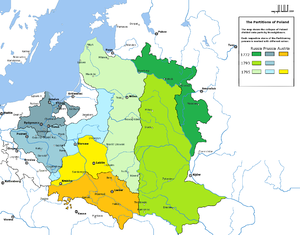Third Partition of Poland
The Third Partition of Poland (1795) was the last in a series of the Partitions of Poland and the land of the Polish–Lithuanian Commonwealth among Prussia, the Austrian Empire, and the Russian Empire which effectively ended Polish–Lithuanian national sovereignty until 1918. Accordingly, the partitioning powers agreed to permanently erase Poland's name from existence, including from their respective encyclopaedias.
Following the First Partition of Poland in 1772, in an attempt to strengthen the greatly weakened Commonwealth, King Stanislaus Augustus put into effect a series of reforms to strengthen Poland's military, political system, economy, and society. These reforms reached their climax with the enactment of the May Constitution in 1791, which established a constitutional monarchy with separation into three branches of government, strengthened the bourgeoisie and abolished many of the privileges of the nobility as well as many of the old laws of serfdom. In addition, to strengthen Poland's international standings, King Stanislaw signed the Polish-Prussian Pact of 1790, ceding further territories to Prussia in exchange for a military alliance. Angered by what was seen as dangerous, Jacobin-style reforms, Russia invaded Poland in 1792, beginning the War in Defense of the Constitution. Abandoned by her Prussian allies and betrayed by Polish nobles who desired to restore the privileges they had lost under the May Constitution, Poland was forced to sign the Second Partition of Poland in 1793, which ceded Dobrzyn, Kujavia, and a large portion of Greater Poland to Prussia and all of Poland’s eastern provinces from Moldavia to Livonia to Russia, reducing Poland to one third of her original size prior to the First Partition.
Outraged with the further humiliation of Poland by her neighbors and the betrayal by the Polish nobility, and emboldened by the French Revolution unfolding in France, the Polish masses quickly turned against the occupying forces of Prussia and Russia. Following a series of nationwide riots, on March 24, 1794, Polish patriot Tadeusz Kościuszko took command of the Polish armed forces and declared a nationwide uprising against Poland’s foreign occupiers, marking the beginning of the Kościuszko Uprising. Catherine II and Frederick William II were quick to respond and, despite initial successes by Kosciuszko’s forces, the uprising was crushed by November 1794. According to legend, when Kosciuszko fell off of his horse at the Battle of Maciejowice, shortly before he was captured, he said "Finis Poloniae," meaning "this is the end of Poland."
...
Wikipedia

